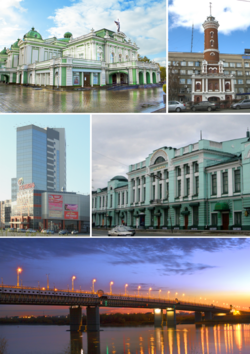Omsk, Russia
| Omsk (English) Омск (Russian) |
|
|---|---|
| - City - | |
 |
|
 Location of Omsk Oblast in Russia |
|
|
|
|
|
|
|
|
|
|
| City Day | First Saturday of August |
| Administrative status (as of December 2009) | |
| Country | Russia |
| Federal subject | Omsk Oblast |
| Administratively subordinated to | city of oblast significance of Omsk |
| Administrative center of | Omsk Oblast, city of oblast significance of Omsk |
| Municipal status (as of July 2011) | |
| Urban okrug | Omsk Urban Okrug |
| Administrative center of | Omsk Urban Okrug |
| Mayor | Viacheslav Dvorakovsky |
| Representative body | City Council |
| Statistics | |
| Area | 572.9 km2 (221.2 sq mi) |
| Population (2010 Census) | 1,154,116 inhabitants |
| - Rank in 2010 | 7th |
| Density | 2,015/km2 (5,220/sq mi) |
| Time zone | OMST (UTC+06:00) |
| Founded | August 2, 1716 |
| City status since | 1782 |
| Postal code(s) | 644xxx |
| Dialing code(s) | +7 3812 |
|
|
|
| on | |
Omsk (Russian: Омск; IPA: [omsk]) is a city and the administrative center of Omsk Oblast, Russia, located in southwestern Siberia 2,236 kilometers (1,389 mi) from Moscow. With a population of 1,154,116, it is Russia's second-largest city east of the Ural Mountains after Novosibirsk, and seventh by size nationally.
During the Imperial era, Omsk was the seat of the Governor General of Western Siberia, and later of the Governor General of the Steppes. For a brief period during the Russian Civil War in 1918–1920, it served as the capital of the anti-Bolshevik Russian State and held the imperial gold reserves.
Omsk is the administrative center of the Siberian Cossack Host. It also serves as the see of the bishop of Omsk and Tara, as well as the administrative seat of the Imam of Siberia.
Omsk stretches along the banks of the north-flowing Irtysh at its confluence with the smaller Om River. The city has an elevation of 87 meters (285 ft) above mean sea level at its highest point.
Omsk is an important railroad hub, and is the junction point for the northern and southern branches of the Trans-Siberian Railway. The city also serves as a major hub for the regional highway network. River-port facilities handle both passengers and freight, giving the city access to navigating the extensive waterways of the Irtysh and Ob River. The waterways connect Omsk with the coal and mineral-mining towns further up the river in Kazakhstan, as well as with the oil, natural gas and lumber operations of northern Siberia. Omsk is served by the Tsentralny Airport, which offers access to domestic and international (primarily, German and Kazakh) destinations, making the city an important aviation hub for Siberia and the Russian Far East.
...
Wikipedia



